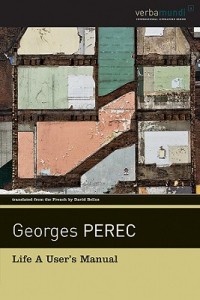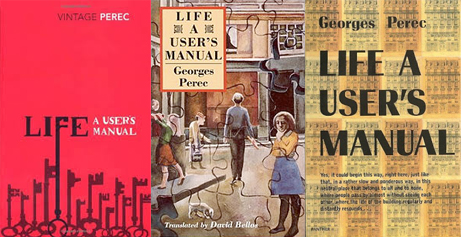 Life: A User’s Manual
Life: A User’s Manual
by Georges Perec
Translated by David Bellos
David R Godine, 2008
685 pages / $22.95 Buy from Amazon
We were briefly offered one possible way out of the overwhelming Order that was being brandished against us: Writing, they said, could become like a kind of a game, in which the rules are made transparent, the walls clearly delineated, all objects in their proper places, the experience of reading itself an observation of the established rules left to frustrate all possible variables against themselves for the length of a poem, a story, a book. She bemoaned her loneliness, felt estranged by her intelligence, but would also brag, gripe, brag, about the capacities given unto her by her remarkable talent for finding her way around a party, the geometry of pleasing arraignment, a kid genius of the light touch, claiming she knew what to give people to make them happy, to make them like her, cried, felt lonely, spent time in and out of centers for people like her, realized that she was already older than she had thought she would be while all this was still going on for her. None of that without some grounding in truth. A little like following thirty steps of penned directions, winding up in the wrong place, and only looking toward the last step as the source of any possible error. ‘Move like a knight does.’ Couldn’t bear to be around people as bright as her, unless it was one other man. A very slow, considered move across the exposed side of a Parisian flat, moving like a knight does, in a moment that we have to assume is the only possible moment it could be written, no abutting moment qualifies, the fullest instance of a tableau, thereby, for the time being, abstracting death, in that it has ceased to approach. The quiddity of death is in its unceasing approach. Already, we are fighting an uphill battle.
Perec, Calvino, Queneau, others: Oulipians. Calvino’s Invisible Cities: One of those few books that ‘everyone loves’. Calvino: Also well-known for Cosmicomics, similarly well-loved. Those two books comprise the lasting popular of Oulipo. Queneau: Exercises in Style, a book, which, ‘it is good that they exist’, but God forbid anyone ever actually have to read it. He is cellmates with Sol LeWitt. Calvino: Whimsical (Márquez), sexually precious (Pasolini), transparently formal (Coover), with privileged access to some elemental quality of ‘the story’ (Borges). Similarly unconcerned with death—or, at least, a death that whatsoever resembles the death that awaits us poor, existent informalities. Leery of, but on the whole grateful for, him and his place in every bookshelf. Occasional shrugging permitted. People whom we had thought were our friends accused us of creating materials that the bored leisure class could use to occupy the time between now & the timelessness. Some of us responded by creating very detailed wallpaper, apparently.
Out of this, Life A User’s Manual. The most possible observation of the materials that are drawn into the orbit of a life lived, as little possible observation of what it is all these things are to act as a totem against for the persons that acted as gravity wells. For us, the limited but monstrous expansion of the gap between two instants. The first few belayed momentums, in which Perec begins to draw a line and then ceases to draw a line, produce what is best described as the literary equivalent of the phenomenon of ‘learned helplessness’, viz. if one tries something enough times, only to be rebuffed every single time, they will cease trying, will lie down, will lie there. We begin to follow a story’s arc, it is interrupted, perhaps it will be resolved in 600 pages. If it is not, I will certainly not remember which stories were not led nowhere no one saying nohow on, though I take diligent notes, though how on is never complicated. I slip into a pleasant coma. I read more quickly than usual. The music box, yes. The dusty globe, yes. What does death matter? Someone’s uncle had an adventure, once. I am being lied to, I am not being lied to, I cease desiring to rise to the occasion of questioning. Periodic conceptual synchronicities between seemingly disparate entities, as well as immediately attractive prospects (the blanking of a puzzle piece, the forged document, a mistaken identity, a murder mystery concerning a telephone), turn my anesthetized stupor into a mildly giddy audienceship. When someone is ‘poor’, it means that their clothes are rakish or their history a little more multifarious. When someone is a ‘servant’, it means that they are in a different room, or are in a different position in the same room. The thought of the form occasionally recurs, discourages active imagination. The thought of attempting to work out ‘where one is’ or ‘how far is left to go’ is indescribably unattractive.

I pay good attention and take a lot of notes. I think that this book is better suited to my temperament than to most people’s, probably, in that I can read it for four hours without moving much. If everyone thinks that way, it is probably A Good Book. Once I have read it for four hours, I am four hours closer to dying. I am told about the contents of some boxes. Sometimes a book reminds me why I read, although I seem to forget very quickly. Very frequently I wonder why I read. In the middle of Life A User’s Manual, I wonder if I am the victim of a test to determine who feels as though they have too much time. I may be failing by not putting the book in the garbage and going dancing with my friends. I don’t like to dance, yet. Someone spent longer writing this book than I spent reading it, and that person died years before I was born. I am told about a mirror. The structure of the book makes it apparent from the first moment that, at the end, one of a few things will have to happen, the same as any romantic comedy ends with some superficial variation on a few essential configurations prefigured by the number, personalities, and affects of the main characters. The nature of the variation determines the degree to which the film is ‘progressive’ or ‘conservative’, apparently. David Markson’s Wittgenstein’s Mistress tests patience, and then, out of sight, retroactively converts every word along the path into a breaking force which tears itself out from inside. As does Good Old Neon. As does Malone Dies. The proving grounds of books that reek of ‘a thought experiment, followed through upon’ is whether they can effectively turn one back upon one’s hundreds of pages of saying, ‘yes, I know, yes, yep, alright.’ Whether they can bring one in touch with what one was signaling by the way in which one acknowledged what was being signaled to one. At the end of Life A User’s Manual, an incomprehensibly well-executed book, the sort of thing that it is hard to believe one single person was capable of producing on his own, alone in a room, one of the prefigured forms comes. Just as one suspected. Then the book is over.
***
Gil Lawson is a writer from Santa Fe, NM. His work has appeared or is forthcoming in, among other places, n+1, The Hypocrite Reader, Bard Papers, and a series of chapbooks put out by Two-Suitor Press. He currently lives in Brooklyn, NY. Follow him on twitter @gil_lawson.
Tags: Georges Perec, Gil Lawson, Life: A User's Manual

Linguistic mediation could become like a kind of game
–Rilke (transl. mine)